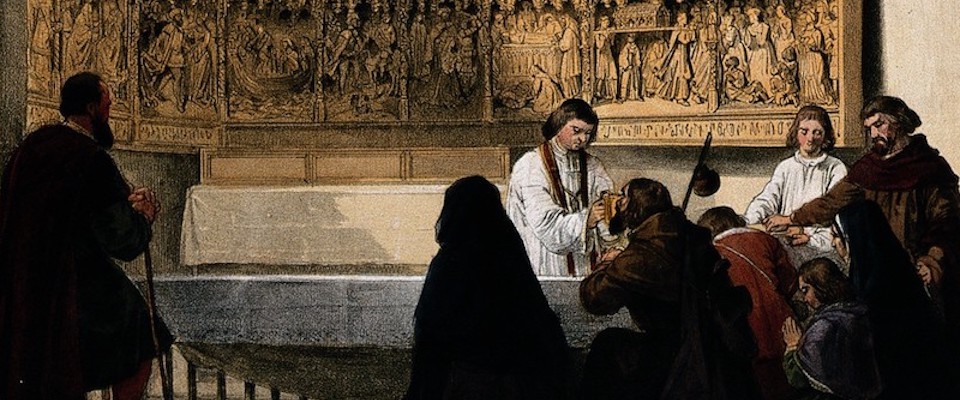Saint of the Day for January 30: Blessed Mary Angela Truszkowska (May 16, 1825-Oct. 10, 1899)
January 30, 2019Kathleen Beckman: Spiritual Battles Beg For Spiritual Responses
January 30, 2019
By Msgr. Charles Pope • January 29, 2019
As we continue to read the Letter to the Hebrews in daily Mass, we are reminded that although the Temple liturgies were glorious and elaborate, they merely pointed to the perfect sacrifice of Christ.
Let’s consider three things regarding the saving work of Christ:
IT IS SURPASSING. At Tuesday’s daily Mass we read this passage:
The Law is only a shadow of the good things to come, not the realities themselves. It can never, by the same sacrifices offered year after year, make perfect those who draw near to worship. If it could, would not the offerings have ceased? For the worshipers would have been cleansed once for all and would no longer have felt the guilt of their sins. Instead, those sacrifices are an annual reminder of sins, because it is impossible for the blood of bulls and of goats to take away sins (Hebrews, 10:1-4).
All the shed blood of lambs could not save. Those offerings only pointed to the true Lamb of God and our Passover, Jesus Christ. Even the extravagant offering of a bull could never pay our debt of sin; only Jesus could redeem us, paying the price of our salvation. All those ancient sacrifices could only remind us that by our sins we had a debt we could not pay; they could only serve to symbolize our repentance.
The Temple, though glorious—one of the wonders of the ancient world—was not Heaven itself, but a poor copy. Monday’s reading said,
For Christ did not enter into a sanctuary made by hands, a copy of the true one, but heaven itself that he might now appear before God on our behalf. Not that he might offer himself repeatedly, as the high priest enters each year into the sanctuary with blood that is not his own; if that were so, he would have had to suffer repeatedly from the foundation of the world. But now once for all he has appeared at the end of the ages to take away sin by his sacrifice (Heb 9:24-28).
Christ does not operate on some movie set or some earthly copy of Heaven. No, he enters the real temple, the Holy of Holies in Heaven, a place not made with human hands but eternal.
Unlike the high priest, who must repeat the offering again and again, Jesus does this once and for all. Thus, the Mass is not a re-sacrificing of Christ but a making present of His perfect, once-for-all sacrifice. Calvary and its fruits are made present and applied to us in every Mass.
IT IS SUBMITTED. What was the sacrifice that Christ offered? It was surely His suffering and blood, but it was more than that and deeper as well. We also read this passage at Tuesday’s Mass:
Therefore, when Christ came into the world, He said, “Sacrifice and offering You did not desire, but a body You prepared for me. In burnt offerings and sin offerings You took no delight. Then I said, ‘Here I am, it is written about Me in the scroll: I have come to do Your will, O God’” (Heb 10:7-9).
Thus, it is also by Christ’s submission to the Father’s will, by His obedience, that we are saved. His suffering and the shedding of His blood are expressions of that obedience. His suffering and obedience are so together as to be one, and yet we can distinguish them. Had Christ suffered without having obediently willed it, we would not be saved. It was thus necessary for Him to take a human nature—and thereby a human will—so that he could obey His Father. We are saved by the human decision of a divine person. Christ’s obedience to the will of the Father undoes Adam’s disobedience, and that obedience is expressed in His sufferings.
Tuesday’s reading from Hebrews concludes as follows:
By this “will,” we have been consecrated through the offering of the Body of Jesus Christ once for all (Hebrews 10:10).
IT IS SINGULAR. Christ Himself is singularly and personally the sacrifice that saves us. In the older, imperfect Temple rituals, the priest sacrificed something distinct from himself (a lamb, a goat, a bull, or some turtle doves), but Christ the perfect priest sacrifices His very self! As we read in the text just above,
… but a body You prepared for me. … Then I said, ‘Here I am, it is written about Me in the scroll: I have come to do Your will, O God.’
On coming into the world, Christ did not sacrifice something else or someone else (none of which could save). No, He sacrificed His very self, who alone can save us!
Consider well, then, Christ’s surpassing priesthood, His submitted obedience and His singular sacrifice. Be grateful for what He endured out of love for us and for His Father. His is the perfect, once-for-all sacrifice to the Father.
Of the Glory and Means of our Salvation in Christ Jesus







